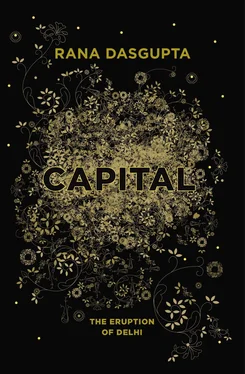Aarti has to take a minute to establish her class position. Her story has additional weight because she is someone .
“My side of the family is well-known too,” she says. “Both my grandfathers were titled. My father’s father was from Jalandhar. He became chief engineer of the railways: he was knighted and received an OBE. They were a famous Delhi family who used to be very close to Indira Gandhi. My mother’s family came from Lahore — they lost everything in 1947 and came over to stay in Delhi. My grandfather did very well in business and acquired a grand mansion in the diplomatic enclave.”
She is so Delhi. It drives me crazy.
“My husband was never sick. He was 6’1” and strapping. He never wore glasses. He never went to a dentist in his life and his teeth were all his own. When he was seventy years old he used to thrash thirty-five-year-olds on the badminton court. He never took a rest in the afternoon. During the forty-three years we were married, apart from a few colds and a back injury, I don’t remember him ever being ill.
“In October 2009 everything went wrong. On 4 November he went into hospital and by 5 February of the following year, he was gone.
“The problem was never diagnosed, though I sent his tests to dozens of doctors. It started with a viral fever and then he became very weak. A low-grade fever continued for some time. A multitude of tests were done. We were sent to see endocrinologists who gave him expensive drugs. At first those drugs put him in a cold sweat and then they gave him a stroke.
“You see, he never took medication in his life. If he had to take an aspirin he used to cut it in half. He couldn’t take so much medicine. They started pumping antibiotics into his system four times a day just because it cost 5,000 rupees [$100] a time. I said, ‘What are you doing? You are only thinking about drugs and money, but I love him and I can see what it’s doing to him.’
“They started chemotherapy without a diagnosis! They had no idea what was wrong with him. The doctors were so well-known, I felt I had to do what they said. But each time I listened to the doctor, my husband got worse. And it was only when I didn’t listen that he got any better.
“I took him out of that hospital and went to another. I went with all his test results but they wanted to test everything again — there was incredible over-testing. They said they wanted to do a biopsy of his lymph nodes, which had become swollen with all the medication. It would be a simple procedure with a local anaesthetic.
“The night before it was supposed to happen I was sleeping in his hospital room when I suddenly woke up. It was dark, it must have been one in the morning, and I saw there was a beautiful nurse standing in the room. If you saw her you would say, ‘What a beautiful woman!’ So I opened my eyes and saw this extremely beautiful woman standing by my husband’s bed. She had brought a form for him to sign, authorising the hospital to do a much more expensive procedure under general anaesthetic. Can you imagine? My husband was almost delirious with the drugs, and he would have woken up in the middle of the night to see this angel in his room asking him to sign a piece of paper? I told her to leave, that this wasn’t what the doctor had told us, and I took my husband out of that hospital the next morning.”
The combination of high costs and low information that characterises this system is an insidious one, and leads to a paranoid panic which only makes things worse. Patients consult twenty doctors because they trust none of them. They abort therapies and change hospitals, with the result that there is no sustained treatment.
“When we arrived in the next hospital, my husband began to recover. They gave less medication. His platelet levels had dipped to 45,000 per microlitre before we came there — they are supposed to be above 150,000 — but they began to rise again. After a few days, he was ready to leave hospital. But they decided they had to get more revenue out of him, and they faked his blood test result.
“He was ready to leave: he was putting on his scarf. He hated being in hospital and was very happy to be leaving. Usually, the blood tests came up automatically on the monitor in his room. On that morning they did not. He was getting his coat on but we couldn’t leave before the test results arrived. There was no reason to worry — his platelet count had risen from 45,000 to 90,000 while he had been in that hospital.
“I went to ask why the results had not come. No one could tell me. The doctor said, ‘Let me call the lab myself.’ He looked at me and without listening to anything on the other end he told me that my husband’s platelet count had fallen to 43,000 and that he needed an emergency transfusion.
“I went into a panic. If his levels had fallen so much in ten hours, how much further could they fall? There was no question of going home — he could go into a coma. ‘I’m sorry my love,’ I said, ‘but you have to have a transfusion.’ I was panicking and not thinking that anything might be wrong. I had to find a donor quickly. My nephew rushed from Gurgaon to donate platelets. He was so sweet. He came as soon as he could. When he learned he had to give five litres of blood he went white, but he still gave it. He is like my third son now. I will never forget what he did.
“By the evening, everything was ready for the transfusion. Before going ahead, they did another blood test as per procedure. I demanded to see the results of that test. My husband’s platelet count was 90,000. Which meant it had never fallen in the first place! They had not given us the results in the morning just so they could sell a blood transfusion for 50,000 rupees [$1,000].
“During this whole time there had been a Sikh doctor in Texas who was monitoring our situation. He was a cancer specialist who had treated one of my friends. He was the only doctor who paid real attention to the reports I sent. Every evening he would call up at his own expense to find out what was happening. There was so much kindness in his voice. He knew what was going to happen and gave me advice about it. He said, ‘He could start developing fluid in his lungs — you have to be careful.’ So I told the doctors but they didn’t care about anything we said, the bastards — and then he got fluid in his lungs. The doctor from Texas told me to make sure he wasn’t given any steroids and then when he came to this hospital they started giving him massive doses and his system packed up.
“It was this hospital that killed him. They were so trigger-happy with medicines that they killed him. Before that, he had started picking up. When he went into the intensive care unit here — which is when I met Amit and Shibani — it finished him. I left him for a few minutes and when I came back he had tubes stuck in everywhere, and he was grunting and breathing terribly. He had burn marks on either side of his neck, which I never found an explanation for. I took him out of intensive care: I said he’ll die in my arms, not with all these strange faces peering at him. They’d put a central line in him because they didn’t have the patience to deal with the oedema from where the drip went in. I went back over the documents and saw that two minutes after they’d done that his heart had stopped beating.
“After he died I started my own investigation. In the early days I could only take a bit at a time because I would break down with the pain. But now I am starting to be much more serious. I am researching everything. Knowledge is never wasted. Money is wasted. Partying and merrymaking can be wasted. But knowledge, never.
“Twenty years ago, my husband’s sister persuaded their father to sign the family house over to her so she could sell it to developers without my husband’s permission. I went on a war footing. I had my own thriving business at the time but I put the whole thing on hold to throw myself into the legal battle. My husband couldn’t do it: he was ready to collapse, seeing his sister and father turn against him. For two years I did nothing else. I read legal textbooks and taught myself the law. I learned how everything worked. I learned to manoeuvre through the lawyer-judges nexus. And I fought the case myself. I was up against a big racket of builders and real-estate people but I won the case in two years. I made everyone’s life hell for all that time and in the end they had their hands together, pleading with me to leave them alone. No one could believe a case like this could be finished in two years — usually they take twenty. I had pulled out documents that no one could believe, ancient property files lost in Old Delhi.
Читать дальше











